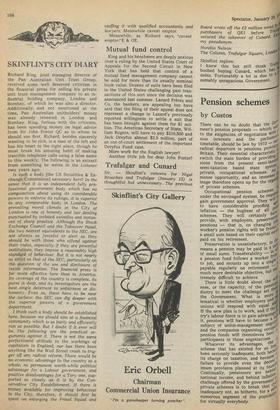SKINFLINT'S CITY DIARY
Richard King, joint managing director of the Pan Australian Unit Trust Group, received some well deserved criticism in the financial press for selling his private unit trust management company to an industrial holding company, London and Bombay, of which he was also a director. Additionally, and not mentioned at the time, Pan Australian unitholders' money was already invested in London and Bombay. King, furious with the criticism, has been spending money on legal advice from Sir John Foster QC as to whom he should sue first. Richard, besides sincerely wanting to be rich, is a man of the left and has his heart in the right place, though he must break his amusing habit of making irascible telephone calls using a false name to this weekly. The following is an extract from something he wrote in the Listener two years ago: Is such a body [the US Securities & Exchange Commission] necessary here? In the sense that it is an independent fully professional government body which has no compunction about using its considerable powers to enforce its rulings, it is superior to any comparable body in London. The prevailing moral climate in the City of London is one of honesty and fair dealing punctuated by isolated swindles and instances of sharp practice. Although the Stock Exchange Council and the Takeover Panel, the two nearest equivalents to the SEC, are not always as forceful or alert as they should be with those who offend against their codes, especially if they are powerful institutions, they impose a reasonably high standard of behaviour. But it is not nearly as strict as that of the SEC, particularly on the question of the use and disclosure of inside information. The financial press is far more effective here than in America. Its coverage of the country is complete, its purse is deep, and its investigators are the best single deterrent to unfairness or dishonesty. Even so, these have to be near the surface: the SEC can dig deeper with the superior powers of a government department.
I think such a body should be established here, because we should aim at a financial community which is as fairly and efficiently run as possible. But I doubt if it ever will be. The following are the practical arguments against it. There is not the same perfectionist attitude to the workings of capitalism in England, nor has there been anything like the Wall Street crash to trigger off any radical reform. There would be no economic advantage to the country as a whole; no permanent worth-while political advantage for a Labour government, and positive disadvantages for a Tory one, supported as closely as it is by the Conservative City Establishment. If there is money available for improving behaviour in the City, therefore, it should first be spent on enlarging the Fraud Squad and staffing it with qualified accountants and lawyers. Meanwhile caveat emptor. Meanwhile, as Richard says, `caveat emptor!E & OE.
Mutual fund control
King and his henChmen are deeply anxious over a ruling by the United States Court of Appeals for the Second Circuit in New York that has held that control of a mutual fund management company cannot be sold for more than its usually nominal book value. Dozens of suits have been filed in the United States challenging past transactions of this sort since the decision was announced last summer. Lazard Freres and Co, the bankers, are appealing but have said that the filing of their appeal does not represent a change in Lazard's previously reported willingness to settle a suit that has been brought against them for $1 million. The American Secretary of State, William Rogers, will have to pay $210,500 and Jack Dreyfus almost $2.9 million, part of an out-of-court settlement of the important Dreyfus Fund case.
More work for the English lawyer? Another little job for dear John Foster?
Trafalgar and Cunard
Sir, — Skinflint's concern for Nigel Broaches and Trafalgar (January 15) is thoughtful but unnecessary. The previous Board wrote off the £2 million owed purchasers of QE1 before T secured the takeover of Cunard. my pseudonym.
Horatio Nelson The Column, Trafalgar Square, Loncfrflt Skinflint replies: I knew this but still think Tr° boobed buying Cunard, which /las debts. Fortunately a lot is due to a sumably unrapacious Government.










































 Previous page
Previous page